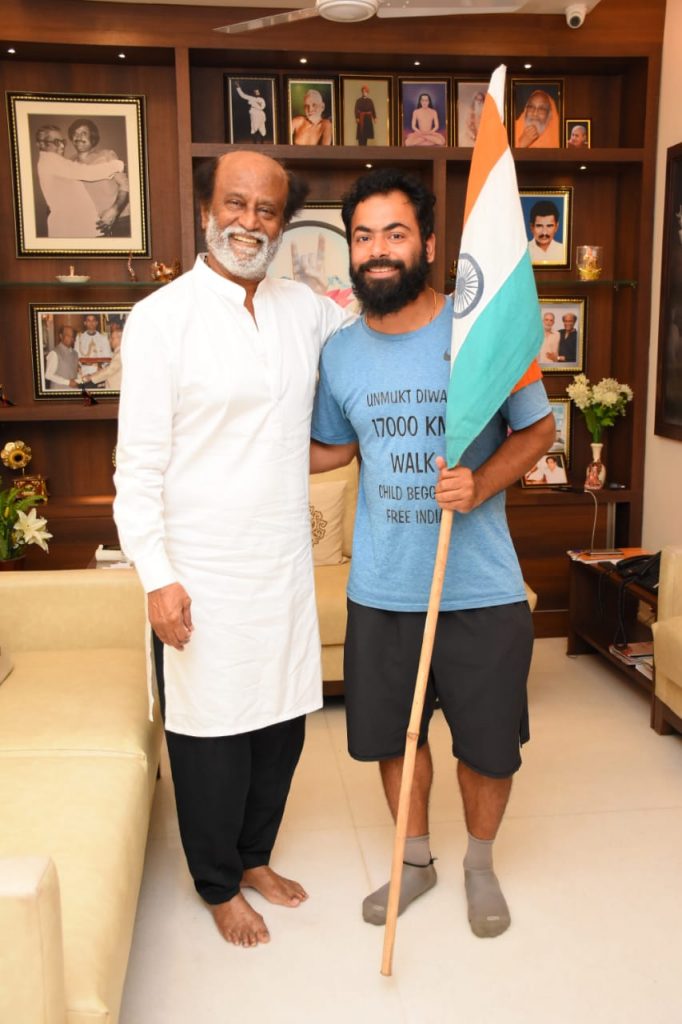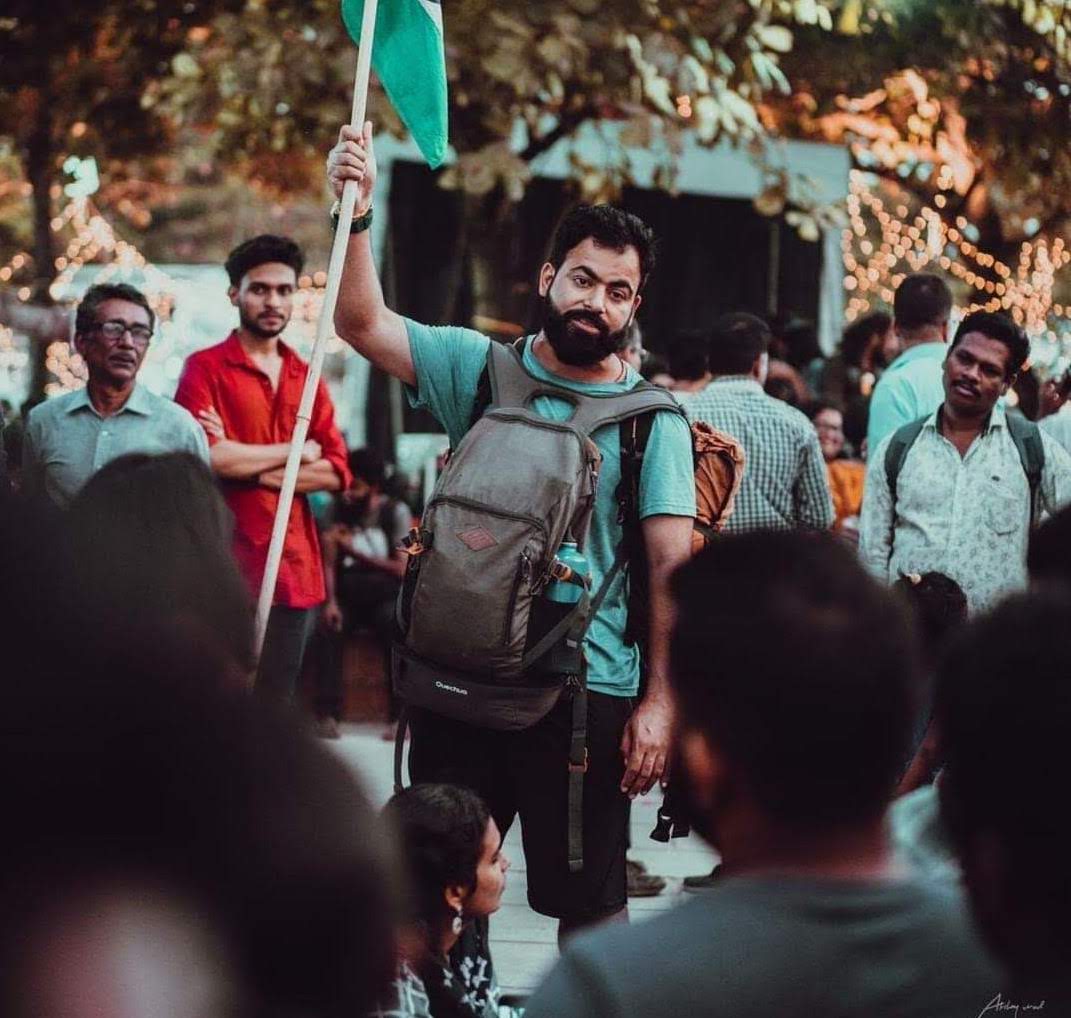Foot soldier Ashish Sharma was abducted in Madhya Pradesh, was affected by jaundice in Guwahati (and three other places) and was mugged in Jammu as he traversed the different states of India.
However, his faith and determination to make India child-begging free kept him going.
Back home, in Delhi, Ashish worked as a production engineer at Dan Bloc Brakes India Pvt. Ltd. Besides, he was an abstract artist and regularly wrote poems.
Things changed when he met a nine-year-old child beggar on a street in Delhi one day.
He managed to rescue nine kids from different parts of the city and sent them to school with the help of some non-governmental organisations.
The incident prompted him to think about the root cause of the issue.
How it all started
On August 22, 2017, Ashish quit his job to start a 17,000 km walk called ‘Unmukt India’.
Holding an Indian flag in one hand and a heavy backpack on his shoulder, 29-year-old Ashish Sharma keeps his spirits high by shouting “Jai Hind!” after every few kilometers.
On the 569th day of his walk, at his last stop Chennai, Ashish left his house with the same vigour.
He stopped at schools, colleges, tea stalls, and metro coaches to educate people about child beggars.
On his way, he also met actor Rajnikanth and his wife Latha. His ‘Duayen Foundation’ tied up with Latha Rajinikanth’s NGO – ‘Shree Dayaa Foundation’ which aims at protecting children from domestic and emotional abuse, trafficking and exploitation.
“It was a dream come true to meet Rajini sir and his wife. I had got in touch with them months ago through a newspaper article to make this happen,” Ashish said. He also met politician Kamal Haasan.

Ashish meeting veteran actor Rajnikanth at his residence in Chennai. Image credit: Deepika Agrawal.
Ashish said, “APJ Abdul Kalam had envisaged every child of India going to school by 2020. Since he is not with us anymore, it is our responsibility to fulfill his vision.”
Through his one-man-army campaign, Ashish has vowed to do the same by bringing the state governments and citizens on the same board. “The point is very clear to me. It isn’t about what good will I bring to the society but about how many bad things I will be able to eliminate,” he said.
His two close friends have been funding him through his journey. “Initially, I was not confident. I did not know what all would be needed in the journey. With time, I have gained enough knowledge about how to walk on foot – alone. I eat simple food and prefer a liquid diet,” Ashish said.
His journey aims to bring about a spiritual and psychological revolution.
He draws from the concept of Sanatan dharma which preaches that messengers of God should walk on foot. “I believe that change cannot come merely by writing about it. I walk because I have immersed myself in this spirituality.”
Difficult times
Paul Salopek, the two-time Pulitzer winner journalist, who is walking around the world to tell stories, had said, “Walking helps one break down the barriers. When you approach people on foot, you become a part of the human landscape. It helps to establish a connection with people much more quickly.”
Ashish continued walking even when he was diagnosed with jaundice in Guwahati.
However, he has his weak moments too.
Ashish breaks down into tears when he thinks about his parents. He often lies to his mother about his comfort and health.
“I could not tell my mother that I slept on street thrice because I was unable to find shelter. It would bring her to tears,” he said.
When Ashish left his home, one of the conditions that he had set for himself was to meet everyone on the go.
This condition landed him in a trouble in Jabalpur when a baba (ascetic) abducted him and locked him in an ashram.
“The baba wanted me to stay for three months because he knew I am not a normal human being if I have started out on such a difficult journey. He wanted to use me for his own purposes,” Ashish recalled. However, he managed to escape through a washroom by jumping to the other side of the wall.
And got back to his mission.
The path ahead

Ashish Sharma standing at a sea coast in Andhra Pradesh. Image credit: Deepika Agrawal.
Ashish’s ‘Duayen Foundation’ has also made a mobile application which helps people get in touch with responsible authorities when they see a child beggar on the street.
The app will be connected to various institutes like NGOs, hospitals, schools and government departments.
Currently, the app is being used by four to five of Ashish’s friends as a part of a pilot survey. It will be unofficially launched in the country in the first week of April or May. “The plan is to get it officially launched by the country’s prime minister. Let’s hope for the best,” Ashish said.
Ashish’s next big project is to open a school in every railway station across the country – where the most number of child-beggars or trafficked children can be spotted.
He aims to involve the railways minister, the women & child development minister and the home minister in this project. “I also plan to seek a special permit from the prime minister to channelise the 32 lakh NGOs registered in India,” Ashish said.
Ashish’s epic walk enabled him to meet various state leaders, veteran actors like Rajnikanth and Kamal Haasan, and various bureaucrats who have vowed to support him in his endeavours. It won’t be too much of a stretch if he meets the prime minister at some point.
When he finally arrived in Delhi on March 24, he led a welcome rally from Begumpur Chowk to Karala which was joined by 10,000 to 15,000 people, including wrestler Yogeshwar Dutt and boxer Dinesh Kumar.
He will hold a marathon with one million people on June 14 2019, observing the day as ‘Unmukt Diwas’ and making people pledge to make India child-begging free.
‘You are not alone in this journey,’ reads the motto of ‘Unmukt Diwas’.
Deepika Agrawal is a 23-year-old journalism student at Asian College of Journalism
All images provided by the author

